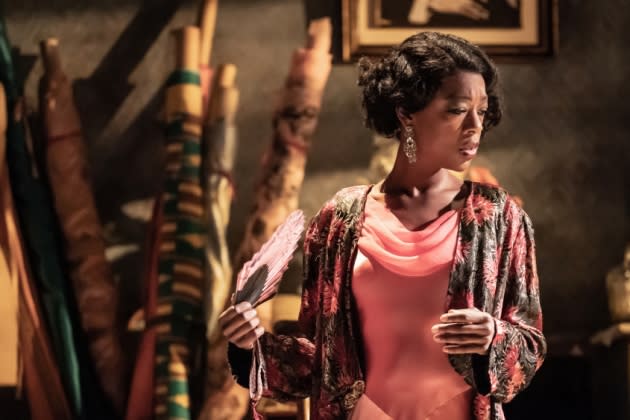‘Blues for an Alabama Sky’ Review: Samira Wiley Stars in a Richly Rewarding Production of Pearl Cleage’s Play
- Oops!Something went wrong.Please try again later.
- Oops!Something went wrong.Please try again later.

Part of the instant appeal of “Friends” was that, from the get-go, the relationships between the members of the gang who hung out in the apartments above Central Perk felt not just likeable but absolutely lived-in. The same is absolutely true of the perfectly meshed cast of Lynette Linton’s beautifully directed National Theatre production of Pearl Cleage’s “Blue for an Alabama Sky” in London. Cleage’s 1930s-set rooming-house drama is far more wide-ranging — it ultimately encompasses tragedy as well as comedy — but its glowing hallmark throughout is its ability to keep audiences basking in its warmth.
Glowingly lit by Oliver Fenwick with a palette rising to richly expressionist crimson, Frankie Bradshaw’s towering, vividly atmospheric set goes from the front stoop to the rafters of a down-at-heel Harlem house. It’s here we meet drunk Angel (a birdlike yet commanding Samira Wiley, in her U.K. stage debut), who staggers back to the home of snappy costume designer Guy (hilariously smart-mouthed Giles Terera, London’s knockout Burr in “Hamilton”). A self-styled “notorious homosexual,” he takes pity on his long-time friend who has not only lost her boyfriend but her job singing in a nightclub.
More from Variety
'The Crucible' Review: A Soggy London Revival of Miller's Masterpiece
'Jack Absolute Flies Again' Review: A Knockout New Comedy by the Writer of 'One Man, Two Guvnors'
Jimi Hendrix Documentary Boarded by DCD Rights - Global Bulletin
Bigger on hope and humor than they are on cash, the two of them are dreamers trading everything necessary to get by. Yet neither of them is willing to countenance being victims. Guy is, against all the odds, making his life work while longing to go to Paris to become Josephine Baker’s designer. Given his open sexuality, he’s highly attuned to the politics and aggression of the society he lives in. But as he instructs, “You ever see me in a fight with a bear, you help the bear.”
Angel, by contrast, refuses, a la Blanche Dubois, to entertain too much reality. Waking up on the couch, perilously hung over, she categorically refuses to listen to “tales of the downtrodden without some aspirin.”
Their lives are increasingly intertwined with that of their naive neighbor across the hallway. Played with delicious comic timing by an alternately wide-eyed, defiantly sincere and gleeful Ronkẹ Adékoluẹjo, Delia is both excited by and slightly scared of the world and Angel’s and Guy’s rackety lives. Added to all this is the complicated attraction she feels for the charms of Guy’s friend Sam, the doctor running the pioneering birth control clinic where Delia works.
As Sam, Sule Rimi illustrates his character’s dedication to socially concerned medicine not with earnestness but with enormously relaxed charm. And that’s the quality most apparent in Linton’s pacing of all four actors, who play scenes with the rhythm and delight of a quartet of perfectly matched musicians.
But everything shifts with the arrival of Leland (Osy Ikhile), a stranger from Alabama who, glimpsed at the play’s opening, then returns with his own brand of hope having fallen dangerously for Angel’s abundant charms.
Cleage’s writing for Leland, whose attitudes upsets everyone’s equilibrium, is less nuanced and her plot-heavy dramaturgy suffers. Even though the playing of the romances remain as highly amusing as they are touching, their trajectories tip towards the predictable, thanks in no small part to the sudden appearance of a gun in the hands of the increasingly reactionary Leland.
But Linton cunningly balances out this inevitability with increasingly deft use of four additional actors who she weaves in and out of the house, leading the cast in Benjamin Kwasi Burrell’s powerful song-settings of words drawn from poems by Langston Hughes, who lives in the play as a mentioned off-stage character.
The overwhelming empathy built up by Linton’s richly detailed, wonderfully controlled production casts any doubts aside. To describe this, her National Theatre debut, as auspicious is putting it mildly. She and her immaculate company ensure that the blues of the title are, not just metaphorically but literally, very much alive.
Best of Variety
Sign up for Variety’s Newsletter. For the latest news, follow us on Facebook, Twitter, and Instagram.
